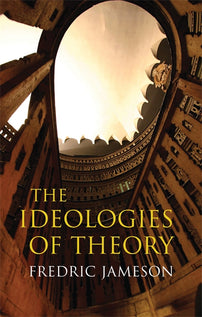Orienting towards the social totality
Alberto Toscano reflects on Fredric Jameson's The Geopolitical Aesthetic as part of our Jameson at 90 series.

First delivered as a series of talks at London’s National Film Theatre in the Spring of 1990, then published in 1992 – the same year as Fukuyama’s The End of History and the Last Man – The Geopolitical Aesthetic brought dialectical criticism to bear on capital’s changing order in a moment that seems both impossibly distant but which we’ve also never entirely left behind. In its method, as in its insights, it continues to resonate for those of us who are persuaded that ‘all thinking today is also, whatever else it is, an attempt to think the world system as such’, and who also share in Fredric Jameson’s affirmation of ‘the passion and the value of the epistemological itself’.
I was first drawn to these pages in the wake of the 2007-8 global financial crisis and the consequent recalibration of aesthetic and political energies in the direction of a wholesale reckoning with the mode of production, at a time when the temporary impasse of accumulation on a world scale was doubled by the ‘sound barrier’ – to use Jameson’s vivid metaphor – hit by our social imagination. Above all, in the bravura essay on totality as conspiracy, while stringing together pearls of dialectical insight (my favourite, perhaps, the illumination of the heist genre as a prefiguration of communist sociality), Jameson sketched some critical lines of march that retain their force today. First, that we must orient ourselves in our critical work, but also in our sensory attentiveness, to the social totality – in full awareness of the repeated thwarting of our desires, of our uncanny incorporation into this capitalist whole, of the sheer representational impossibilities involved. The incipit of his essay on Edward Yang’s The Terrorizers, ‘Remapping Taipei’, limns this predicament, viscerally: ‘The social totality can be sensed, as it were, from the outside, like a skin at which the Other somehow looks, but which we ourselves will never see. Or it can be tracked, like a crime, whose clues we accumulate, not knowing that we are ourselves parts and organs of this obscenely moving and stirring zoological monstrosity.’ Elsewhere, polemicising with those who might reduce the totality’s spatial unfolding to ‘following across a map insurance red lines and the electrified borders of private police and surveillance forces’, Jameson forcefully asserts the need to tackle the historically new, original and fundamental representational problem posed by a late capitalism which ‘cannot be detected on the surfaces scanned by satellites’. All the essays then amount to so many ways of training our bodily senses and formal sensibilities to move from ‘vivid miseries’ to their ‘non-visual systemic cause’, in other words to develop ‘self-consciousness about the social totality’. This generally requires the ruse of indirection or laterality, ‘using a nightmare we understand to conjure up a nightmare we can’t even imagine’.
[book-strip index="1"]
But the essays that comprise The Geopolitical Aesthetic are not just chronicles of instructive failures of representation, they are also calls for a reprogramming of our habits of perception and our relation to reproductive media technologies, in such a way that – following Brecht’s Short Organon – we may be led ‘to take pleasure in the possibility of change in all things’. In a manner that is far more palpable to me today than when I first picked up the book a decade and a half ago, this is a critical investigation through film on the aesthetics of systemic transition. Aesthetic not simply in the sense of an interrogation of artworks, artforms and genres, but of the very perceptibility of change, the sensation (aesthesis) of the (‘bad’) new. This is a profoundly mediated aesthesis, of course, foregrounding and thematising the media of technological reproducibility in a condition whereby philosophy collapses into media theory but the latter turns out to be swarming with metaphysical subtleties and theological niceties, and is compelled to heed the allegorical caution – weirdly crystallised by Cronenberg’s Videodrome, inter alia – that ‘if everything means something else, then so does technology’. This technological over-determination is sharpened now, as is the very representational problem of transition (in the totality), by anachronism, as when Jameson tells us that computerized media technology ‘faxes an unheard-of simultaneity across its branches’, as we are reminded of obsolete genres like the 1980s ‘guerrilla-war correspondent film’, or perhaps more strikingly when the world-system whose geopolitical unconscious these essays mine takes the triadic form of US, EU and Japan.
Yet tarrying with those anachronisms opens up avenues for revisiting this book at a time when it is not so much the ‘non-visual systemic cause’ – capital’s invisible real abstraction – that incites our anxious representational passions but the uncertain mutations of the world-system itself – in the shadow of endless wars and climate collapse. At the incommensurable intersection of the individual subject and the ‘collective web of the hidden social order’ is the visibly unstable order of nation-states, the imploding ‘international order’, with its sedimented histories from that short twentieth century which ended around the time when Jameson first delivered these essays (Cold War, Warsaw Pact, Non-Alignment, Third World…). The spatiality (real, imaginary, and symbolic) of this broken and unfinished transition is marked in the book by its separation in two parts: one for conspiracy as the representational style of the cultural and military hegemon, the other for multiple mutations of once-were Second and Third Worlds reinventing allegory under neo- and post-colonial conditions. Jameson’s residual and reflexive fidelity to a kind of epistemic anti-imperialism is one of the richer legacies of Geopolitical Aesthetic, as when he reminds us denizens of the ‘long night of universal domination’ that: ‘What the First World thinks and dreams about the Third can have nothing whatsoever in common, formally or epistemologically, with what the Third World has to know every day about the First. Subalternity carries the possibility of knowledge with it, domination that of forgetfulness and repression – but knowledge is not just the opposite of forgetfulness, nor is domination the opposite of oppression.’
[book-strip index="2"]
Contrary to the vulgate about a postmodernity conceived of as at once flattening and fragmenting claims to difference and aspirations to totality – such that conspiracy as the ‘poor man’s cognitive mapping’ of the overdeveloped core would be our only, and terminal, style – The Geopolitical Aesthetic suggests that we may wish to look beyond the ‘enfeebled center’ of the world-system, and especially to those ‘attempts to refashion national allegory into a conceptual instrument for grasping our new being-in-the-world’, as we continue to struggle against that relapse into ‘a pre-World War I international system’ which Jameson already diagnosed as one of the symptoms of our interregnum. What this book christened the geopolitical unconscious is undergoing further mutations today but remains crucially at stake in that diremption between the individual and the collective which forms (and films) both reveal and resolve, exacerbate and exorcise.
See all works by Fredric Jameson here. His new book, Inventions of a Present: The Novel in its Crisis of Globalization is out on May 7.
[book-strip index="3"]




